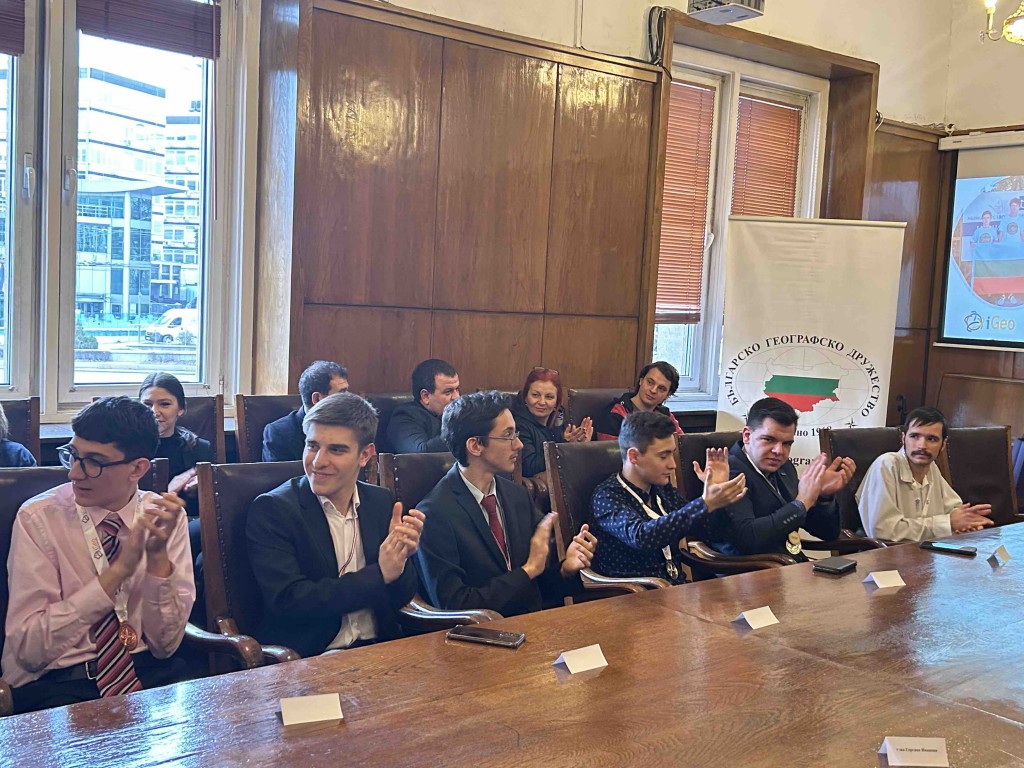With a total of 7 medals from the last two International Geography Olympiads, the Bulgarian students won for Bulgaria one of the leading places in the world
On February 25 in the rectory of the SU “St. Kliment Ohridski” at a solemn ceremony organized by the Ministry of Education and Science, the Bulgarian medal winners of the last two International Geography Olympiads and their teachers were awarded.
In the conditions of a record number of participants and extremely high competition, the Bulgarian athletes managed to win a total of 7 medals (1 gold, 5 silver and 1 bronze) at the 17th and 18th International Geography Olympiads. These are half of the total of 14 medals won by our country for its participation in this prestigious competition since 2004.
Representatives of the Ministry of Education and Science, the academic and scientific community, the Atlantic Club in Bulgaria and Esri Bulgaria, sponsor of the national geography team, took part in the solemn award ceremony, presenting the prestigious awards to the Bulgarian Olympians and their teachers.

Photo: Press center of the Ministry of Education
Teodor Kostov from the Mathematical High School “Dr. Petar Beron”, Varna, received an Olympic gold medal. The 5 silver medals were won by 4 competitors: Antonio Georgiev from the “Acad. S. Korolev” Natural and Mathematical High School, Blagoevgrad, Daniel Dimitrov from the Varna Mathematical High School (with two medals from the two Olympiads in a row), Mikhail Paskalev from the Varna Mathematical High School and Denis Urumov from the First German Language High School in Sofia. Atanas Ivanov from the National Nature and Mathematics High School “Acad. L. Chakalov” was awarded a bronze medal.
Evgenia Karadjova, manager of Esri Bulgaria, personally awarded one of the medalists and congratulated all the Olympians, their teachers and parents, saying that: “If geography is one of the oldest sciences, Geographic Information Systems today are a symbol of a deep and complex research and analysis, they are a benchmark for a modern, innovative platform for multidisciplinary interaction” and added “I am extremely happy and satisfied when I see the results of the GIS in School program that we launched two years ago. We already have more than 360 schools all over Bulgaria that work on this program, more than 1100 teachers, about 11 thousand students who study with GIS. GIS is their toolkit with which they can detect trends, analyze connections, but most of all find the solutions of the future – how to create sustainable care for our Earth.”
The chairman of the Bulgarian Geographical Society and head of the “Cartography and GIS” Department at the GGF Assoc. Steliyan Dimitrov said that now students have the opportunity to study a new geography, different from the one he himself studied at the university. The reason why descriptive geography turned into an exact science is precisely geospatial technologies and their very dynamic development in recent years. “The new geography is highly technological, GIS are one of the three fastest growing technologies, along with nano and bio technologies. All this makes geography a very exciting science, but also a great profession. In the last 10 years, according to data from the American Bureau of Labor: Geography graduates are the third, as they call them, the most employable, that is, the most able to find a job, specialists,” stressed Prof. Dimitrov.
The dean of the Faculty of Geology and Geography, Prof. Naydenov, revealed that from the next academic year, a new bachelor’s program will be launched, which will be in English only – Climate Change and Management.
###